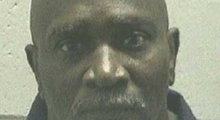The U.S. Supreme Court issued a late-night stay of execution Tuesday for a black Georgia inmate named Keith Tharpe, whose 1991 trial for murder was tainted by a racist juror.
The stay was issued over the dissent of Justices Clarence Thomas, Samuel Alito, and Neil Gorsuch. It will remain in effect while the justices decide how to proceed with the case.
“We’re gratified the Court understands this case merits thoughtful consideration outside the press of an execution warrant,” said Brian Kammer, one of Tharpe’s attorneys.

Keith Tharpe. (Screenshot/Georgia Department of Corrections)
Tharpe was scheduled to be executed by lethal injection at 7:00 p.m. Tuesday for the murder of his sister-in-law, Jaquelyn Freeman. Tharpe ambushed Freeman on her way to work in 1990, angry that she had provided assistance to his estranged wife, who was also present during the confrontation. He dragged Freeman from her car, killed her with a shotgun, raped his wife, then forced her to withdraw money for him from a nearby credit union.
He was convicted of murder and kidnapping three months later and sentenced to death.
A post-trial interview revealed that one of Tharpe’s jurors, Barney Gattie, held deeply racist views, and trafficked in racial epithets during the trial. Several years after the trial, Gattie told a legal aide group advising Tharpe that he didn’t believe blacks have souls.
“After studying the Bible, I have wondered if black people even have souls,” he said. In the course of the interview, he also revealed he was acquainted with the Freeman family, despite swearing before the court he had no connection to them whatever. Georgia argues that the evidence is too attenuated to stop the execution, because it is now impossible to ascertain how Gattie’s views affected the deliberations. Gattie is now deceased, and the interviews at issue were conducted some 20 years ago.
The Supreme Court ruled in March that a general rule ensuring secrecy in jury deliberations does not apply if racial animus affects the proceedings.
“The progress that has already been made underlies the court’s insistence that blatant racial prejudice is antithetical to the functioning of the jury system and must be confronted in egregious cases,” Justice Anthony Kennedy wrote in the case for a five-justice majority.
Send tips to kevin@dailycallernewsfoundation.org.
All content created by the Daily Caller News Foundation, an independent and nonpartisan newswire service, is available without charge to any legitimate news publisher that can provide a large audience. All republished articles must include our logo, our reporter’s byline and their DCNF affiliation. For any questions about our guidelines or partnering with us, please contact licensing@dailycallernewsfoundation.org.


